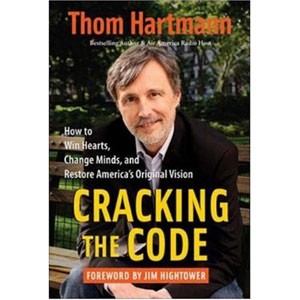
- Cracking the Code: How to Win Hearts, Change Minds, and Restore America's Original Vision by Thom Hartmann
Just in time to read before long holiday dinners and the even longer religious and political "discussions" that follow, Hartmann's newest book is the survival guide helping us chew and digest all the fat affixed to our arguments. If you read and re-read this book Hartmann promises "you'll become an agent of change, in the finest tradition of those brilliant and unconsciously competent geniuses Thomas Paine, Thomas Jefferson and the cousins Roosevelt." This promise should sound, look or feel good to you depending on how you mentally organize the information.
In four parts and 14 chapters, Hartmann hands us tools and instructions for creating clear, effective communication that cuts to the core of how we sort basic information. More than a mere manual to win friends and influence others, Hartmann synthesizes current communication theories into a detailed, easy-to-follow story. Hartmann uses examples from a variety of contemporary and historical political sources, from Lincoln's Emancipation Proclamation to current web-based McCain ad campaigns.
The code works like this: We sense raw information in our bodies, use our brain to connect that information to an emotion. Then we rationalize. Hartmann hopes these insights speak to the gaps in liberal thinkers' abilities to stand toe-to-toe with conservative communicators like Rove, Luntz and Gingrich on issues such as Social Security, abortion and health care. Succinctly, all the strategies in this book are told to us in story. And the most repeated stories in the book are the basic stories liberals and conservatives tell themselves about the world. These simple stories are how we inform our basic beliefs about human nature. Reading this book won't help you answer the question of intrinsic human goodness or wickedness, but it will help you recognize when we use these core stories to support actions and policies that seem unrelated to the larger philosophical picture.
Tired of being verbally bullied by a boss, father-in-law or some stubborn sound-bite citizen? This book is the cure. Even though it emphasizes thoughtful political communication, we can use the skills presented to become a message masseuse for any type of communicative act.
One danger of any book presenting strategies for communicating better is that some take the advice as an endorsement to become a verbal bully. However, Hartmann's motive is tempered by a worldview that all communicative acts are grounded in a commonplace: our bodies. Without explicitly saying it, sending and receiving information under this view is ethical because it involves us intimately with one another. So, as the holidays approach and the political season slides into spin cycle, get prepared to crack those coded messages with Hartmann's help.
Comments